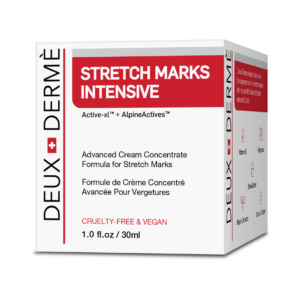Stretch marks are caused when skin tears due to being pulled more tightly than it’s capable of stretching. Think of skin like a rubber band. New rubber bands will stretch very far and are difficult to break. However, if you leave a rubber band sitting for a long time and then try to stretch it, the rubber band will not stretch very far before snapping. Over time, the rubber band loses its elasticity and becomes dry, brittle, and very easy to tear.
Skin, like the rubber band, becomes less elastic with age. Within your skin, a protein called collagen is what keeps skin soft, youthful, and flexible. However, as you grow older, your body produces less collagen. Depleted levels of collagen in the body results in wrinkles as you age, and it can also result in a significantly increased change of developing stretch marks at times when your body is changing due to pregnancy, weight gain, or weight loss.
Promote Collagen Production Through Proper Nutrition
While declined collagen production is a natural part of aging, you may be able to encourage your body’s continued production of collagen by eating foods that are rich in amino acids, vitamins, and minerals. Ensuring that your diet consists of the following foods regularly may increase your body’s production of collagen and significantly reduce your chances of developing stretch marks:
| Lean Proteins: | Vegetables: | Fruits: |
| · Salmon
· Tuna · Tofu · Beans · Egg whites · Peanuts · Oysters · Chicken · Turkey · Lentils |
· Broccoli
· Spinach · Kale greens · Brussel sprouts · Carrots · Garlic · Red peppers · Edamame · Beets · Green beans |
· Cherries
· Blueberries · Raspberries · Blackberries · Tomatoes · Oranges · Lemons · Limes · Grapefruit · Avocados |
H2O
Drinking the recommended amount of water daily will also help you prevent stretch marks by keeping your skin hydrated. Doctors recommend drinking at least 8 cups of water each day. If you struggle with drinking the proper amount of water or have a hard time keeping track of how much water you drink in a day, consider filling a two-liter bottle with water each night to ensure you have an indicator of your progress toward your water goal the next day.
Sugar
Collagen is a protein. When you consume too much sugar, the excess sugar in your blood will attach to the protein in your body and will damage it. In order to prevent damage to your collagen fibers, make sure you aren’t eating too much sugar too frequently over long periods of time.
Doctor’s Approval
Remember to check with your doctor before making drastic changes in your diet in order to ensure that the changes you’re making are healthy and appropriate for your specific health conditions and dietary needs.
Alternative Methods of Stretch Mark Prevention
If catering your diet to prevent stretch marks isn’t something you’re willing to commit to, there are other ways of preventing stretch marks. Many stretch mark prevention lotions and creams are available. When applied regularly, these creams will soften skin and encourage continued elasticity. Browse a list of stretch mark prevention products.


